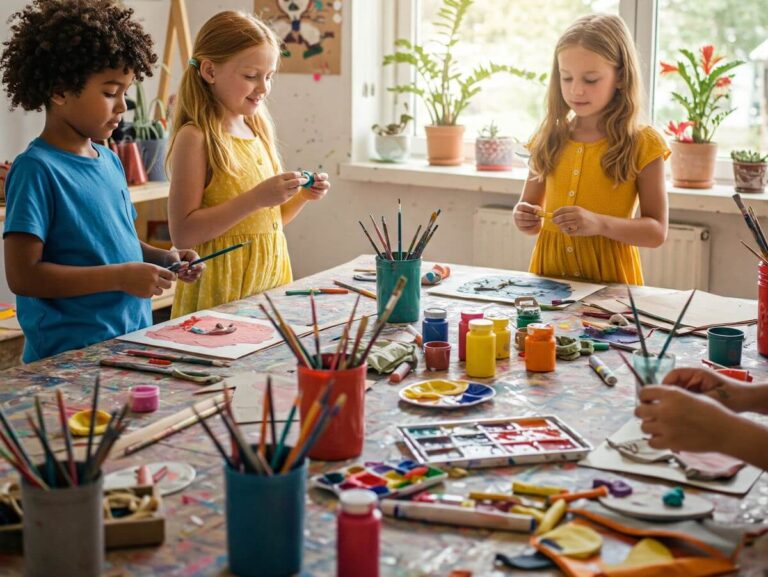Branding is a vital component in the context of creative workshops, serving as the foundation upon which your creative endeavors are built. At its core, branding encompasses the process of creating a unique identity for your workshop that resonates with your target audience. This identity includes elements such as your workshop’s name, logo, color scheme, messaging, and overall aesthetic. By establishing a clear and consistent brand, you not only differentiate yourself from competitors but also communicate your values, mission, and vision to potential participants.
Building a strong brand for your creative workshops is crucial for multiple reasons. First, a well-defined brand enhances recognition. When potential participants encounter your workshop, whether online or offline, a strong brand identity makes it easier for them to remember and recognize your offerings. This recognition can significantly impact their decision-making process as they navigate a marketplace filled with various options.
Moreover, a robust brand fosters loyalty among participants. When individuals feel a connection to your brand, they are more likely to return for future workshops and recommend your services to others. This loyalty is not solely based on the quality of the workshop experience; it often stems from the perceived value associated with your brand. Consistent branding efforts create trust and reinforce the quality standards participants can expect, thus facilitating ongoing relationships.
Finally, an effective brand attracts your target audience. By clearly defining who you are and what makes your workshops unique, you can create marketing strategies that resonate with your ideal participants. This alignment can lead to improved engagement, heightened interest, and ultimately, increased enrollment for your creative workshops. In summary, understanding the importance of brand building in the creative workshop arena is key to establishing a successful and enduring presence in your chosen market.
Identifying Your Unique Selling Proposition (USP)
In the competitive landscape of creative workshops, it is crucial for facilitators to identify their Unique Selling Proposition (USP). This distinct factor serves as the cornerstone of your brand, setting your workshops apart from others in the market. A well-defined USP not only highlights what makes your offerings unique, but also communicates the specific value attendees can expect from participating in your workshops.
The first step to pinpointing your USP is to analyze your strengths and the strengths of your workshops. Consider what skills, experiences, or methodologies you bring to the table that may not be offered by others. For instance, you might possess a background in a specialized art form, use innovative teaching techniques, or provide a particularly supportive environment that nurtures creativity. Take the time to reflect on your expertise and how it translates into a meaningful workshop experience.
Next, it is important to gather feedback from previous attendees. Conduct surveys or interviews to understand what aspects of your workshops they valued most. This not only aids in honing your USP further but also makes attendees feel valued and involved in your creative community. Their insights can highlight unique features that may have been overlooked, such as the collaborative atmosphere or tailored content that resonates deeply with learners.
Additionally, research your competition. By examining other workshop facilitators in your niche, you can identify gaps in their offerings that your workshops can fulfill. Find ways to elevate your curriculum, expand upon available themes, or integrate current trends to meet the evolving needs of your audience. Ultimately, a clearly defined USP will not only attract potential participants but also foster brand loyalty as they come to recognize the value you consistently deliver through your workshops.
Crafting Your Brand Identity
Establishing a strong brand identity is critical for the success of your creative workshops. It encompasses how your audience perceives your brand and forms the foundation for all your marketing efforts. To begin with, effective logo design is paramount. A well-crafted logo should be simple yet memorable, encapsulating the essence of what your workshop offers. Whether you choose an abstract symbol or a typographic representation, ensure that it aligns with your workshop’s mission and values.
Color schemes play a significant role in brand identity as they evoke emotions and convey messages. Research indicates that different colors elicit various feelings; for example, blue is often associated with trust, while yellow embodies optimism. Select a color palette that resonates with your target audience and enhances the overall experience of your workshops. Consistent application of these colors across all materials—from websites to promotional content—creates brand recognition and reinforces your identity.
Another fundamental aspect to consider is typography. The typefaces you choose should be legible and reflect the character of your brand. A playful, creative workshop might benefit from more whimsical fonts, while a professional skill-building session may require cleaner, more traditional typefaces. Combine these fonts thought critically to create a cohesive visual identity that enhances readability and aligns with your brand message.
Overall aesthetic is equally important. This includes visual elements such as images, graphics, and layouts, which should all harmonize to present a clear identity. Your branding should convey not only what your workshop teaches but also the experience participants can expect. By meticulously crafting each of these elements, you create a cohesive visual identity that resonates with your target audience, fostering a sense of community and belonging.
Developing a Brand Voice and Messaging
A strong brand voice and messaging strategy are essential for effectively communicating your workshop’s mission and values. Establishing a consistent voice not only helps you connect with your audience but also sets your creative workshops apart from others in the market. A thoughtfully crafted brand voice can evoke emotions and inspire potential participants to engage with your offerings.
To begin developing your brand voice, consider the essence of your creative workshops. Reflect on what makes them unique and what emotions you wish to evoke in your participants. Ask yourself the following questions: What is your workshop’s mission? What values do you want to promote? Understanding these core elements will help shape your overall messaging strategy.
Once you have a firm grasp on your mission and values, it is important to articulate the tone of voice that best represents your brand. The tone can be formal, casual, inspirational, or even playful, depending on the audience you wish to target. For instance, if your creative workshops aim to foster a relaxed and friendly environment, an inviting and conversational tone may be appropriate. In contrast, if you are focused on professional development, a more authoritative and informative tone might resonate better.
Furthermore, language style plays a significant role in reinforcing your brand voice. Utilize language that aligns with your target audience’s preferences and expectations. Consider avoiding jargon that may alienate potential participants. Instead, aim for clarity and accessibility, using relatable terms that engage your audience. Key messages should be concise and memorable, encapsulating the essence of your creative workshops and inviting potential participants to explore further.
In conclusion, developing a distinctive brand voice and messaging strategy is paramount in building an effective identity for your creative workshops. By aligning your tone and language with your mission and values, you can establish a strong connection with your audience, encouraging them to participate and engage in your offerings.
Creating a Strong Online Presence
In today’s digital age, establishing a robust online presence is crucial for any brand, particularly those centered around creative workshops. A well-crafted online identity not only enhances visibility but also fosters trust and loyalty among your audience. The first step in this process is identifying the appropriate digital platforms that align with your brand’s aesthetic and target demographic. Common platforms include social media channels such as Facebook, Instagram, and Pinterest, each offering unique opportunities for engagement and interaction.
Social media serves as an excellent medium for showcasing your workshop content, sharing testimonials, and providing sneak peeks of upcoming sessions. To create engaging content, consider leveraging a mix of visual elements, such as high-quality images and videos, alongside informative captions. Curated content plays a significant role in building an audience. Sharing insights, tips, and behind-the-scenes processes can position your brand as a knowledgeable leader in the creative workshop space.
It is equally important to maintain regular interaction with your audience. Responding to comments, messages, and feedback creates an opportunity for meaningful conversations. Hosting live Q&A sessions or utilizing polls can further engage your followers, fostering a sense of community around your brand. Additionally, consider collaborations with other creators or brands that share a similar audience; this can significantly expand your reach and introduce your workshops to new potential participants.
Furthermore, maintaining consistency across all digital platforms reinforces your brand identity. This includes a unified voice, cohesive visual branding, and consistent posting schedules. By investing time and effort into creating a strong online presence, you not only enhance the visibility of your creative workshops but also cultivate a loyal audience eager to participate in your offerings.
Building Community Around Your Brand
Establishing a sense of community around your creative workshops is essential for fostering loyalty and encouraging repeat attendance. Community can be built through various strategies, enabling attendees to feel connected not just to the workshop itself but also to each other and the brand. This connection can be the cornerstone of a successful workshop series.
One effective method for engagement is to create interactive opportunities both during and after the workshops. Utilizing social media platforms can enhance this experience; for example, creating a dedicated group where attendees can share their projects, exchange feedback, and offer support fosters collaboration. Regularly posting engaging content related to the workshop themes keeps the community active. Encouraging participants to share their works by tagging your brand helps to organically promote your workshops while reinforcing community bonds.
Collaboration is another key strategy. Consider hosting joint workshops with other creators or inviting guest speakers, which not only diversifies the content offered but also introduces participants to new ideas and practices. This collaborative spirit can make attendees feel like they are part of a larger creative movement, strengthening their connection to your brand. Additionally, offering incentives for referrals or group discounts can encourage word-of-mouth referrals, further expanding your community.
Creating a supportive environment is critical. Regularly soliciting feedback allows attendees to feel valued and heard. Acting on this feedback demonstrates your commitment to their interests, leading to an increased likelihood of repeat attendance. Additionally, consider hosting periodic social events or gatherings to celebrate milestones or achievements related to your workshops. Such events enhance the emotional and social aspects of your brand, solidifying loyalty and encouraging a sense of belonging among participants.
Leveraging Partnerships and Collaborations
In the competitive landscape of creative workshops, establishing partnerships and collaborations can significantly enhance brand visibility and credibility. Collaborating with like-minded businesses, influencers, or brands within your niche provides an opportunity to reach a broader audience while reinforcing your brand’s position in the marketplace. Such relationships often yield mutual benefits, as each party brings unique resources, audiences, and skills to the table.
One of the primary advantages of partnerships is the enhanced marketing reach that comes from sharing audiences. For example, co-hosting workshops with an influencer can introduce your brand to their followers, who are already interested in similar creative endeavors. This type of collaboration not only elevates brand exposure but also positions your business as a trusted authority when endorsed by reputable partners. Engaging in initiatives like guest blog posts, joint social media campaigns, or cross-promotions can foster an ecosystem of collaboration that boosts all participants involved.
Furthermore, alliances with complementary brands can open avenues for innovative workshop offerings. Imagine partnering with a local art supply store to host workshops where participants receive discounts on materials or exclusive products. This strategy not only enriches the workshop experience but also creates added value for your participants, which can enhance attendee satisfaction and retention.
Additionally, collaborations can lead to unique content creation opportunities, such as co-branded materials, video tutorials, or online courses. By combining resources, you can produce high-quality content that resonates with diverse audiences. This approach not only underlines your commitment to quality but also enhances your educational offerings, making them more appealing to potential workshop attendees.
In conclusion, leveraging partnerships and collaborations can substantially amplify the reach and impact of your creative workshops. By strategically aligning with other brands, you not only expand your audience but also strengthen your brand’s credibility in the creative community.
Evaluating and Adapting Your Brand Strategy
In the dynamic landscape of creative workshops, establishing a robust brand strategy is essential for resonating with your audience and gaining a competitive edge. However, a successful brand is not static; it must evolve in alignment with the changing preferences and needs of your participants. Regular evaluation of your branding strategy enables you to remain relevant and effectively engage your audience.
One effective method to assess your brand strategy is through customer feedback. Engaging your audience via surveys, polls, and direct interviews can provide valuable insights into their perceptions and experiences. By creating an open dialogue, you can gauge their satisfaction levels and identify areas that require enhancement. It is essential to tailor questions to uncover deeper insights, such as their motivations for attending your workshops or what improvements they desire.
Additionally, leveraging analytics tools can help you collect data on participant engagement, session attendance rates, and any changes in demographic trends. This quantitative data can be instrumental in evaluating the effectiveness of your branding efforts. Analyzing these trends allows you to pinpoint which aspects resonate well with your audience and which areas may need refinement.
Moreover, you can conduct A/B testing on various elements of your branding, such as promotional materials or workshop themes, to see which versions yield better responses. This experimental approach can reveal new opportunities for branding adaptation and ensure alignment with the interests of your target audience.
Ultimately, a continuous evaluation process empowers you to make informed decisions regarding your brand strategy. By implementing a systematic approach to gathering feedback and analyzing data, you can effectively adapt your workshops’ branding to appeal more profoundly to your audience, fostering stronger connections and enhancing their overall experience.
Conclusion: The Long-Term Vision for Your Brand
Building a brand around your creative workshops is not merely a fleeting endeavor; it is a journey that requires careful consideration and long-term planning. Throughout this guide, we have emphasized the importance of crafting a unique brand identity that resonates with your target audience. This identity serves as the foundation on which your brand will thrive. It is crucial to remain patient through the ups and downs of this process, as the development of a robust brand does not happen overnight.
Consistency in your messaging and visual branding plays a pivotal role in establishing trust and recognition among participants. When conducting creative workshops, ensure that the branding elements—from typefaces and colors to logos—are uniform across all platforms. This consistency not only enhances the aesthetic appeal but also fortifies your brand’s presence in a competitive market. By focusing on delivering high-quality experiences, you can cultivate lasting relationships with your audience, turning participants into loyal advocates for your workshops.
Furthermore, perseverance is key to navigating the challenges that may arise during this journey. There will be moments of doubt and setbacks, yet maintaining a long-term vision will empower you to stay on course. Continuous evaluation of your strategies and open-mindedness towards feedback will enable you to adapt and grow. As the landscape of creative workshops evolves, being attuned to emerging trends and opportunities will secure your brand’s relevance in the industry.
Ultimately, success in building a brand around your creative workshops is about commitment and vision. By focusing on your long-term goals while executing effective strategies, you foster an enviable brand presence that can endure in an ever-changing creative environment.




